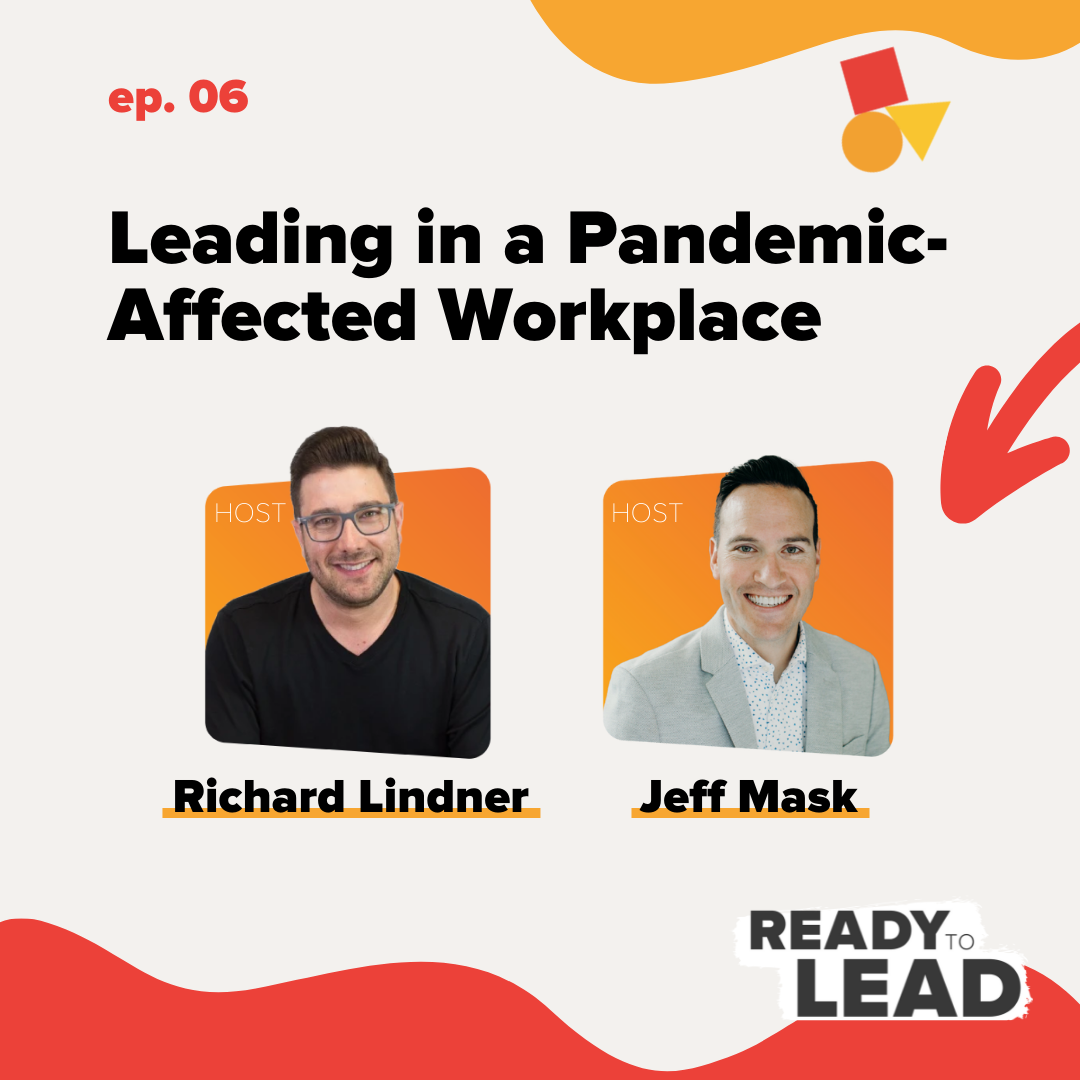You’re not alone if you’re facing anxiety, concerns, and difficult situations in your workplace 18 months into the pandemic—it’s a pattern across the globe.
A lot of people thought (hoped) we’d be back to normal by this point, or at least adjusting really well to our “new” normal. But it turns out there are just a lot of new problems and questions, fears and insecurities.
In today’s episode, co-hosts Jeff Mask and Richard Lindner want you to know you’re not alone. It’s not just a hot topic; it’s the anxiety everyone is feeling, whether or not they realize it. They want to help you understand what’s going on and give you actionable steps to make things better, to give more clarity, to help you realign and reunite your company.
This is how the episode will go:
- Validate what you’re feeling.
- Live in that feeling a little bit.
- Go through some of the causes/effects.
- Give some hope.
Your Experience/Feelings Are Valid
We’ve all been through a lot in the past 18 months, and then we saw some signs that things were getting a little better. Then other things started to creep in. Things like:
- Tension being a little bit higher
- Friction being deeper and hotter
- Pockets in the business that don’t feel as engaged/dialed in
- Resentment
- Entitlement
- Inconsistent sales
- Overall dysfunction within leadership teams
- More easily frustrated with people
Richard shares their company’s story. On Friday, April 13th, 2020, they sent everybody home from their headquarters for a couple weeks, which turned into a month, then a quarter. Then they made the decision to be a virtual first company. They knew they couldn’t go back. They still don’t know if today is a new normal or a temporary normal. They’re in limbo.
A couple weeks ago, things seemed to start getting better-ish, but people started leaving. Everyone wanted to know, what are we doing now? People seemed way more disconnected, out of touch, accusatory in tone. It was harder to get people on the same page. Everything seemed forced. They’re not in a rhythm, not in alignment.
Then people start leaving.
Why Are People Leaving Your Company?
Richard can’t help but think, “Uh oh. Did we make it this far, then we’re going to fall apart? The world is going to get better, and we’re going to crumble? That’s what it felt like.”
“Our thoughts go to dark places,” Jeff says. “Maybe it’s me. Maybe I’m a horrible leader. Maybe the company isn’t as good as I thought it was. Now that things are more stable, people are going where they want to go. Before, they felt imprisoned in this company, but at least it was a place of security. And your ego goes all over the place.”
Richard says yes to the ego. They stepped up and supported their people during the bulk of the last year. They cut other things before people. When the first few people put in their resignation, he had to fight his ego. “How dare you leave us when we didn’t leave you? Do you know how easy it would have been to just cut this, but we didn’t, but nowyou are? That’s my own brokenness and humanity popping up, but I felt it.”
Why are people leaving now? For a lot of reasons. First of all, it felt like a lot, because no one left for 18 months. People were exploring new opportunities because this wasn’t a cultural fit for them. They had hit a ceiling. All types of normal reasons people leave. Natural ebb and flow of turnover happens. But it didn’t for 18 months, so it felt like a lot all at once.
Harvard Business Review has been putting out some great articles about the Great Resignation. It’s helpful to put it into the context of a bigger picture. What occurred during the pandemic was a lot of soul-searching. Why am I doing what I’m doing?
People had a lot more flexibility in where they live and work. They’re leaving companies and also industries—not just because it’s a horrible place to work. Some people leave because your company looks a lot different from the company they signed up for. We’ve changed.
It’s hard enough running a business, and then you slap a pandemic on it. There are so many new variables at play that are tough to navigate.
Communicating Well When You’re Not Face-to-Face
The environment is shifting, so the medium we use to communicate is changing too. Face to face interaction was easier in many ways. The difficulty of going from eyeball to eyeball dialogue to strictly text/Slack/email is that you strip out so much of the richness of communication—tone, body language. As receivers, we fill in the gaps in the texts. And often erroneously when it’s a high conflict situation and we’re lacking nonverbal cues.
One thing Richard does is make himself read the message to someone else or just out loud. Then he checks his tone. Have you ever read a text conversation out loud and noticed the change in inflection/tone when you get to YOUR part? Are you putting a bad guy tone, a Disney villain tone, on the other person’s text? Are you ascribing emotion to the conversation that’s not actually there?
We filter texts through what’s going on with us. We read it with baggage. So Richard does the Disney Villain Test. Take a breath, count to 5, tell himself the best case of what they could have meant, because he just acknowledged the worst case. It probably needs to be a conversation. Want to jump on the phone? Or acknowledge the weirdness.
It takes time, but you have to invest the time upfront to deliver communication the right way from the beginning. A five minute conversation can offset weeks of resentment, underperformance, lashing out. Interpersonal stuff is a domino effect. If you feel that tension, when’s the last time you connected on a personal level with that team member? There are probably other issues happening in their lives that are more important than work.
Some Helpful Tips for Making Those Connections
#1: Use a message matrix.
It’s a simple tool you can download. It lists different scenarios of communication and times to check in or face conflict and different mediums you can use. Knowing which medium to use with what timing with what person is super helpful.
#2: Intentionally build relationships of trust.
Check in on people. Flex your emotional intelligence muscle. If you don’t have a high EQ, ask for help. It’s one of the most critical skill sets we can understand and grow as we’re leading through this unique time.
#3: Give yourself a break.
Stop beating yourself up so much. Stop expecting perfection. Don’t go down the spiral of “everything’s falling apart.”
#4 Acknowledge It publicly.
Not on Facebook, but with your team. A lot of times we leaders think we can’t acknowledge a problem until we have a solution, but that’s a limiting belief. That is a false narrative. One of the most powerful tools a leader has is to acknowledge something is wrong, even if—especially if—you don’t have a solution. You’ll see your team breathe a sigh of relief.
Have a virtual meeting with your team. We know there are a lot of things going on personally, and there are a lot of changes in the business. This is normal. We are going to figure out a solution to make it easier to communicate and collaborate. We don’t have one yet, but we’ll get it. Know that we’re committed to changing it. You’re not alone.
You Can Do This. Tell Us About It.
We’re all working through leading and growing together. No company or leader has it perfectly figured out. That’s okay. Learn from each other. Give yourself space and grace. And take one action today. What’s one thing you can do to create a healthier work environment today?
Richard and Jeff want to hear from YOU. What’s working for you right now? What have you figured out in your organization as a leader that’s helping this transition? And what are your biggest problems? Where are you stuck? What are some areas you can use some help? Where are things going well and why? If you have any really cool tools you’d like to share, they’ll give you a shoutout and share them here on the podcast. If you have questions/problems they can help you find a solution to, email them here:feedback@readytolead.com
OTHER SHOWS YOU MIGHT ENJOY:
- Business Lunch with Roland Frasier and Ryan Deiss
- Perpetual Traffic with Ralph Burns and Kasim Aslam
- DigitalMarketer Podcast


